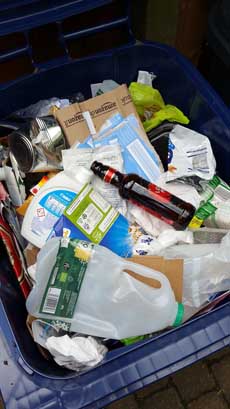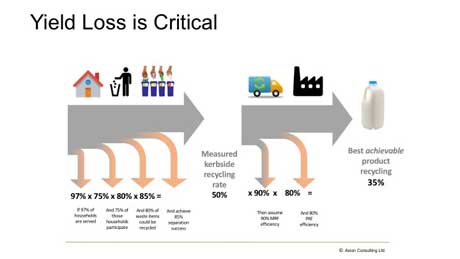
Co-mingled collections are the way forward for councils needing to reduce costs and increase capture of dry recyclables to improve their kerbside recycling rates, claims resource recovery specialist Axion Consulting.
The firm says a ‘consistent’ approach to these collections will make life easier for householders and should recover more materials for reprocessing.
However, co-mingled collections will only work effectively if local authorities take ‘full responsibility’ for ensuring that the materials are directed to ‘modern, advanced Materials Recovery Facilities (MRFs) with good quality sorting and separation technologies’, cautions Keith Freegard, Axion Director.
He suggests separate collections of recyclable materials in up to six boxes are ‘unrealistic’ as they are ‘too complicated’ for householders to do. Although materials are generally well-sorted, yields are low as many people don’t bother. These schemes are also more expensive to operate for councils already under pressure to cut costs.
Keith says: “Local authorities are under massive pressure to cut waste budgets and cost of collection is a major area that can be targeted. Householders find co-mingled collections much easier with just two bins – one for residual waste and the other for recyclables.
“First-stage separation in the waste sorting process is the one that we rely on the unpaid householders of the UK to do. If you want that work team to do a great job, you’ve got to make it really simple and that’s what co-mingled collection does. This approach has been proven to increase the capture rate and the mass yield of materials for the next automated process stages in the recycling system.”
Keith emphasises that this only works in terms of an overall efficient process separation chain, if those councils that have made cost savings by switching to co-mingled collections, ensure that they get high yields of high-quality baled recyclates as the product of the receiving sorting plant.
He points out that for co-mingled collections to be successful throughout the UK there would need to be enough professionally-run well-designed automated MRFs to handle the increased volumes of collections in each of their localities.
“Local authorities must take responsibility for ensuring that the receiving MRF – ideally one that adheres to the MRF Code of Practice – is well-run and is able to get the right levels of separation from their efficiently-collected, high-yield co-mingled waste stream,” he continues. “Those two steps in the chain will then deliver high-volume, high yield and well-separated materials into the recycling sector,” adds Keith.

“The council recycling officers have to take full responsibility for their duty of care in terms of monitoring and policing the value-add sorting that a well-managed MRF should be able to deliver for them.
Axion Consulting, part of the Axion Group, develops and evaluates novel resource recovery processes, tests and operates innovative recyclable collection systems as well as offering business planning and financial analysis.
It can supply the expertise, knowledge and necessary skills to implement projects in the Circular Economy sector, with a specific focus on working with supply chains to deliver successful outcomes, which are both environmentally sound and economically viable.







